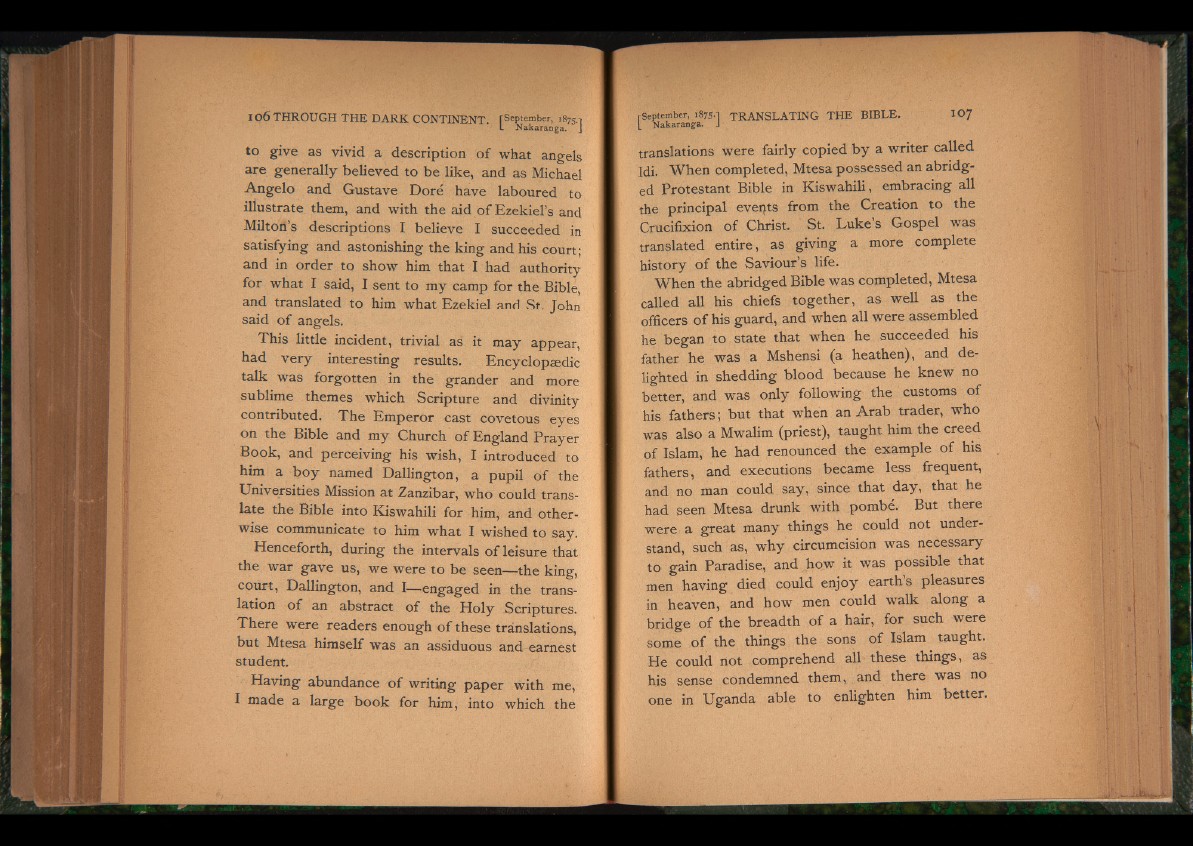
to give as vivid a description o f what angels
are generally believed to be like, and as Michael
Angelo and Gustave Dore have laboured to
illustrate them, and with the aid o f Ezekiel’s and
Milton’s descriptions I believe I succeeded in
satisfying and astonishing the king and his court;
and in order to show him that I had authority
for what I said, I sent to my camp for the Bible,
and translated to him what Ezekiel and St. John
said o f angels.
This little incident, trivial as it may appear,
had v e ry interesting results. Encyclopaedic
talk was forgotten in the grander and more
sublime themes which Scripture and divinity
contributed. T he Emperor cast covetous eyes
on the Bible and my Church o f England Prayer
Book, and perceiving his wish, I introduced to
him a b o y named Dallington, a pupil o f the
Universities Mission at Zanzibar, who could translate
the Bible into Kiswahili for him, and otherwise
communicate to him what I wished to say.
Henceforth, during the intervals o f leisure that
the war g a v e us, we were to be seen— the king,
court, Dallington, and I— engaged in the translation
o f an abstract o f the H o ly Scriptures.
There were readers enough o f these translations,
but Mtesa himself was an assiduous and earnest
student.
Having abundance o f writing paper with me,
I made a large book for him, into which the
translations were fairly copied b y a writer called
Idi. When completed, Mtesa possessed an abridged
Protestant Bible in Kiswahili, embracing all
the principal events from the Creation to the
Crucifixion o f Christ. St. Lu ke ’s Gospel was
translated entire, as giving a more complete
history o f the Saviour’s life.
When the abridged Bible was completed, Mtesa
called all his chiefs together, as well as the
officers o f his guard, and when all were assembled
he began to state that when he succeeded his
father he was a Mshensi (a heathen), and delighted
in shedding blood because he knew no
better, and was only following the customs o f
his fathers; but that when an Arab trader, who
was also a Mwalim (priest), taught him the creed
o f Islam, he had renounced the example o f his
fathers, and executions became less frequent,
and no man could say, since that day, that he
had seen Mtesa drunk with pombe. But there
were a great many things he could not understand,
such as, why circumcision was necessary
to gain Paradise, and how it was possible that
men having died could enjoy earths pleasures
in heaven, and how men could walk along a
bridge o f the breadth o f a hair, for such were
some o f the things the sons o f Islam taught.
He could not comprehend all these things, as
his sense condemned them, and there was no
one in Uganda able to enlighten him better.